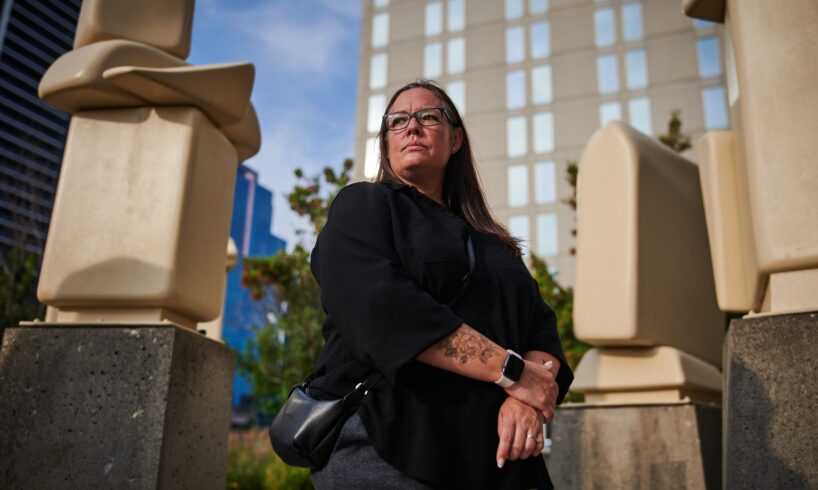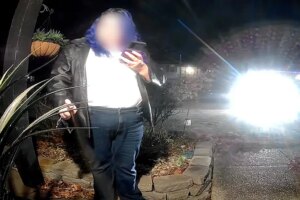
Open this photo in gallery:
London Abused Women’s Centre Executive Director Jennifer Dunn says the Hockey Canada trial verdict may encourage survivors to stay silent about their experiences.Sammy Kogan/The Globe and Mail
Jennifer Dunn’s already difficult job got a little bit harder this week, she said.
Ms. Dunn is the executive director of the London Abused Women’s Centre, an organization that provides counselling and support for women and girls in the region who have been abused, trafficked or sexually assaulted.
One of the major challenges organizations like hers encounters is helping survivors feel safe enough to seek help.
“There is just this overarching fear of not being believed,” she said. “After what happened yesterday, I think it’s a real possibility that some may choose to stay silent.”
Ms. Dunn is referring to the verdict in the Hockey Canada trial.
On Thursday, Ms. Dunn was inside the London courthouse to hear Justice Maria Carroccia’s acquittal of all the accused players.
Here’s everything you need to know about the Hockey Canada sexual-assault trial
Read the judge’s full decision in Hockey Canada sexual-assault trial
Five members of Canada’s 2018 world junior team – Michael McLeod, Carter Hart, Alex Formenton, Dillon Dubé and Cal Foote – had been on trial for the alleged sexual assault of a woman in a London, Ont. hotel seven years ago after a Hockey Canada gala.
Justice Carroccia found all of them not guilty, which Ms. Dunn said was not surprising given how rare guilty findings are in sexual assault cases. What was shocking, she said, is the way in which the judge seemed to attack the complainant in the case, a woman known publicly as E.M.
In an unusual move, Justice Carroccia not only determined that the Crown had not met its burden of proof, she concluded that E.M. had consented to the sexual activity, despite her testimony otherwise. The judge rejected claims from E.M. that she had acquiesced to sexual demands from the players because she had been afraid and intoxicated.
And furthermore, Justice Carroccia concluded that E.M. had been the instigator of sexual activity in the hotel room, accepting a narrative put forward by the players’ defence teams.
Open this photo in gallery:
Demonstrators in support of E.M. rally outside the London, Ont., courthouse on Thursday, ahead of the Hockey Canada trial verdict.Sammy Kogan/The Globe and Mail
“We are all kind of very unsettled, not because necessarily of the decision, but how it happened. There was no accountability for the men at the centre of this case,” Ms. Dunn said. “Not even a message of: ‘Hey, don’t get yourself in that situation again.’ They placed it all on E.M. And that’s where our anger lies.”
Ms. Dunn, who took part in demonstrations outside the courthouse during the players’ eight-week trial, said the judge’s comments about E.M. underscore many survivors’ worst fears about what could happen if they come forward.
“I don’t remember the judge’s exact words, but when she started, she was talking about how rape myths have no place in the courts and then she went right on into rape myths,” Ms. Dunn said.
Robyn Urback: #MeToo changed our culture, but it couldn’t change our courts
The key legal issues at the heart of the Hockey Canada verdict
The case will undoubtedly give some survivors pause before going to police, Ms. Dunn said, but she also worries that it could stop some from reaching out for support from advocacy groups.
“We have a huge job to do now and we already had a huge job,” she said. (Ms. Dunn noted that her organization never presses survivors to report the police, although they can provide support if individuals choose to.)
At St. Joseph’s Hospital in London, health professionals who work with sexual assault complainants are also on the look out for possible shifts.
“Our ears will be open,” said Susan McNair, who is the medical director of the Regional Sexual Assault and Domestic Violence Treatment Program.
“We’re more than aware that this may have a significant impact on some survivors and we’ll be there to support them. We’ll be doing our work with the same commitment and understanding,” Dr. McNair said.
At the bars lining London’s streets, the Hockey Canada verdict hits close to home
The program is one of 37 across the province. The centre at St. Joseph’s Hospital is open 24 hours a day, seven days a week and offers three aspects of care: acute medical care after an incident, forensic collection and psychological care in the short and long-term.
Cassandra Fisher, who is the program’s clinical manager, said that while the program can’t comment on Thursday’s verdict, it can acknowledge that events like this can deeply impact survivors and their families.
“Everything we offer is grounded in choice and confidentially and I think that is especially important as we move forward in this environment,” Ms. Fisher said.
“Also, it’s really important for people to understand that we don’t work for the police. We can work alongside them if that is the choice of the individual who is coming through our program, but they do have the autonomy to make the choice.”





